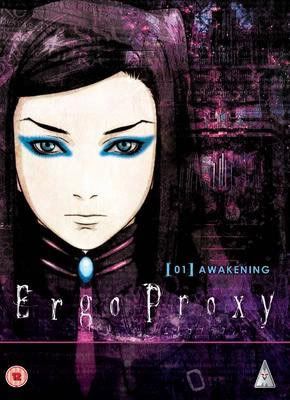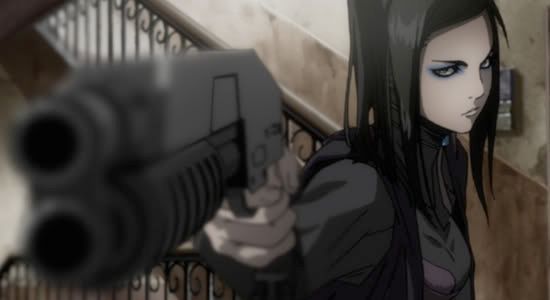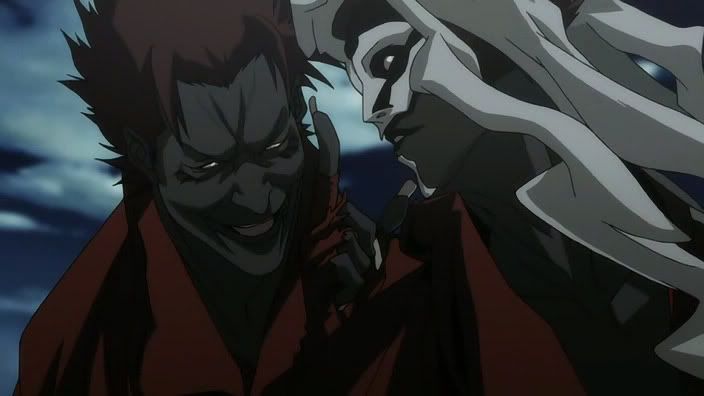Ergo Proxy

Title: Ergo Proxy
Rating: 4/5
Genre: Animé, Sci-Fi, Drama, Mystery
Duration: 25mins (23 Episodes)
Director: Shuko Murase
 Still my mind is reeling from the complex plot posed by Ergo Proxy; this is not the kind of storyline that ever makes itself clear with many important plot details requiring a little thought to reach the logical conclusion; it wont explicitly tell you the answer to many of the riddles repeated throughout the course of the series but for the attentive they are present and waiting to be put into their proper context. Naturally experience with the notion of a dystopian world such as this from other such films – the likes of Dark City, Blade Runner, and perhaps a sprinkling of Dune all spring to mind – will make the transition into this world far more painless as whilst many of the many facets for the directors philosophical ranting feels explored by others before, the manner they are seamlessly combined with devious and mysterious characters comes close to drawing equal to the best of them.
Still my mind is reeling from the complex plot posed by Ergo Proxy; this is not the kind of storyline that ever makes itself clear with many important plot details requiring a little thought to reach the logical conclusion; it wont explicitly tell you the answer to many of the riddles repeated throughout the course of the series but for the attentive they are present and waiting to be put into their proper context. Naturally experience with the notion of a dystopian world such as this from other such films – the likes of Dark City, Blade Runner, and perhaps a sprinkling of Dune all spring to mind – will make the transition into this world far more painless as whilst many of the many facets for the directors philosophical ranting feels explored by others before, the manner they are seamlessly combined with devious and mysterious characters comes close to drawing equal to the best of them.The world of Rondeau takes the centre stage; a domed city built to shield the inhabitants from the uninhabitable wasteland outside; a world destroyed along with most of the human populace in a horrific accident when trying to build an experimental new power generator. Everything is controlled to an almost militaristic degree; people are artificially created with a single purpose in mind – a 'raison d'etre' – and new citizens only emerge to replace those that no longer serve a purpose within the dome. Natural procreation of children is forbidden as it would disrupt the precise population control measures in place and instead families are permitted companion autoriev's; artificially created intelligent that are bound to obey their master but are otherwise virtually indistinguishable from man. Drowning in bureaucracy, the various bureau's dedicating to overseeing the running of the city are so focussed on their own tasks that they remain oblivious to one another, and yet from the surface this city seems heavenly; a world without crime, homelessness or joblessness, but quickly the truth of this deception becomes unveiled.
 Through fear of being killed (or exiled, tantamount to the same thing) the citizens behave and carry out their duties to the letter assisted by entourage autoriev's, this kind designed with functionality in mind, capable of performing as field-medics with direct links to other agencies as well as general companions. These autoriev's can furthermore behave as spies; the eyes and ears of of those in the position of authority to persuade citizens of certain actions over others, and when these artificially created creatures finally succeed in inevitably breaking through their programming allowing them to think independently, they become aware of their self, feel emotions and question their own existence and purpose, a situation referred to as the 'Cogito' infection and treated with decommission by firepower. With immigrants laying in the slums of the city outskirts desperately trying to enter the city and a monstrous entity known only as a 'Proxy' tormenting the inhabitants and further instilling fear into their minds, as our lead protagonist Re-l Mayer explores further the mystery of the Proxy and its link to the immigrant Vincent Law she slowly uncovers the layers of deception told to them about the very nature of their existence.
Through fear of being killed (or exiled, tantamount to the same thing) the citizens behave and carry out their duties to the letter assisted by entourage autoriev's, this kind designed with functionality in mind, capable of performing as field-medics with direct links to other agencies as well as general companions. These autoriev's can furthermore behave as spies; the eyes and ears of of those in the position of authority to persuade citizens of certain actions over others, and when these artificially created creatures finally succeed in inevitably breaking through their programming allowing them to think independently, they become aware of their self, feel emotions and question their own existence and purpose, a situation referred to as the 'Cogito' infection and treated with decommission by firepower. With immigrants laying in the slums of the city outskirts desperately trying to enter the city and a monstrous entity known only as a 'Proxy' tormenting the inhabitants and further instilling fear into their minds, as our lead protagonist Re-l Mayer explores further the mystery of the Proxy and its link to the immigrant Vincent Law she slowly uncovers the layers of deception told to them about the very nature of their existence. Whilst many characters exist there are but a few that bear specific importance; the downtrodden and depressed Vincent Law, the headstrong and arrogant Re-l Mayer along with her entourage Iggy, the devious head of the citizen-security bureau Raul Creed, the infected autoriev Pino, the tortured young doctor Daedalus (of whom I find particularly intriguing to watch) and of course the enigmatic Ergo Proxy. There is, however, one character beyond all these that feels just as important but shrouded in the background: Descartes. “Cogito ergo sum” (I Think therefore I am) and the notion of being indefinitely linked to your 'Raison d'etre' (reason for being) form pivotal elements upon which the entire plots hangs. Even the seemingly irrelevant names given; 'Rondeau,' 'Proxy,' 'Re-l,' 'Daedalus,' 'Pino;' they all have a meaning in our world that reflects that in theirs, foreshadowing many of the events to unfold, and what many of the characters lack in development as the show progresses – the Re-l Mayer from the start of the show behaves like the Re-l Mayer at the end despite all the revelations – they compensate for by being fairly complex in design from the beginning.
 The world too doesn't feel as though the most original creation, the parallels drawn to Blade Runner (which itself is based fairly heavily upon Isaac Asimov's "Do Androids Dream Electric Sheep" from the late 60's) are fairly overt, and the post-apocalyptic tale of inhabitants lied to about the status of the outside world too is not an untold concept. What is unique, however, is the manner its all integrated and given the time to be explored, the nature of the characters given entire episodes devoted to delving into their psyche. It all remains inherently thought-provoking with many of the philosophical questions posed left open ended to determine your own answers, and whilst often coming across more pretentious than anything more intelligent, occasionally feeling as though the eloquent notions of ancient philosophers has been made far more convoluted than neccessary it still manages to invoke interest in the unfolding events.
The world too doesn't feel as though the most original creation, the parallels drawn to Blade Runner (which itself is based fairly heavily upon Isaac Asimov's "Do Androids Dream Electric Sheep" from the late 60's) are fairly overt, and the post-apocalyptic tale of inhabitants lied to about the status of the outside world too is not an untold concept. What is unique, however, is the manner its all integrated and given the time to be explored, the nature of the characters given entire episodes devoted to delving into their psyche. It all remains inherently thought-provoking with many of the philosophical questions posed left open ended to determine your own answers, and whilst often coming across more pretentious than anything more intelligent, occasionally feeling as though the eloquent notions of ancient philosophers has been made far more convoluted than neccessary it still manages to invoke interest in the unfolding events.It certainly isn't a show without its drawbacks, the format itself constituting my major complaint. Each episode retains a self contained story with a well defined beginning and end, loosely following on from the last but with a 'time skip' which can often feels messy as the characters warp from scenario to scenario with no explanation of how they succeeded in getting from one state of affairs to the next. And yet towards the end – particularly the last third – it seems as though they ran out of story to tell and so utilised a number of filler episodes involving encounters with other proxy's, which are ultimately of little significance to the core story at hand. Whilst this allows for some absurd episodes which are entertaining in their own right; complete mindfuck episodes and bizarre entities that remain interesting to watch, I can't help but shake the feeling that the story has been put on hold until the finalé.
The animation varies from the absolutely sublime opening sequence to the somewhat sloppy-feeling that ensues in the latter episodes, the sound carefully disguised in the background, and yet
 with the flaws on display I ended up ordering this show before I had finished it safe in the knowledge that this was not to be the last time I pondered the mystery of the Proxy. The twists come thick and fast and the curiousity is easily enough to sustain interest in this show that is all too easy to watch in a short period of time. This isn't a complete mindfuck without explanation – granted, its confusing until that last piece of the puzzle is finally revealed – but the complex plot does eventually make sense, and the final parallel drawn is not one that I saw coming, yet it requires to be thought about as it may serve to answer a religious question I have long since asked: Why would a God allow suffering? Already too much has been said; this won't replace Blade Runner from your DVD collection but it'll worthily sit beside it, and in a genre as sparse as this it might be a long time before something else encroaches upon its throne.
with the flaws on display I ended up ordering this show before I had finished it safe in the knowledge that this was not to be the last time I pondered the mystery of the Proxy. The twists come thick and fast and the curiousity is easily enough to sustain interest in this show that is all too easy to watch in a short period of time. This isn't a complete mindfuck without explanation – granted, its confusing until that last piece of the puzzle is finally revealed – but the complex plot does eventually make sense, and the final parallel drawn is not one that I saw coming, yet it requires to be thought about as it may serve to answer a religious question I have long since asked: Why would a God allow suffering? Already too much has been said; this won't replace Blade Runner from your DVD collection but it'll worthily sit beside it, and in a genre as sparse as this it might be a long time before something else encroaches upon its throne.
Comments
Post a Comment